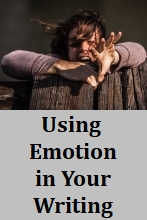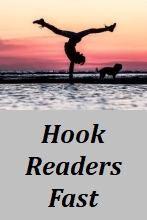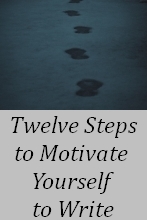Using Emotion in Your Writing
By: Ken Brown
Published: 2/4/2022
Do You Use Emotion as a Writer?

I love to watch College Football
Why? Because it makes my heart POUND. Yeah, I watch college football because it fills me with powerful emotions.
Maybe our ancestors would go out and try to take down a saber-tooth tiger, and that would be enough emotion for a week. But in our twenty-first century lives, we don't have that adrenaline rush like our fore-fathers. We watch TV and read books to fill up our emotional reservoir. Are you including emotion in your stories? Do your novels make your readers' hearts' pound?
When you watch a football game, you're probably already cheering for one team. If you like the five or six teams that always win, there may be a few blow out games during the season.
What if your team is the underdog and they are playing a team ranked in the top five? Your team has lost more games than they won during the conference season and you will be happy if they win a quarter or stay close for most of this game against the expected winners. Let's say that they tied the game after the first quarter. The team you like is doing well against the powerhouse team that has won the conference the last ten years. You're happy and in the back of your mind you wonder if maybe your team can beat them.
What if your team is only down a touchdown at half? In your mind, you're thinking - we can over-come that in the second half. Then the third quarter ends and you're within three points. What's your emotion level? Let me tell you, it's high. You're playing the undefeated champions from last year and you're going toe to toe with them.
Let's talk about your novel now.
How can we get the same feelings from your book that we get in a football game?
1. Your reader has to pick one side. Ideally, the underdog.
The bad guy in your story has all the tools, and has dated Mr. Wonderful throughout high-school. She has the perfect smile, beautiful cheekbones and blue mesmerizing eyes. She's the favorite to win the game to catch Mr. Wonderful.
How about your protagonist? You need a protagonist that is likeable and though she has skills; she isn't at the level of her chief antagonist. Your protagonist has fears, she's unsure of her capabilities and wonders if she can compete with the antagonist. Why will we cheer for her? She has something worth liking, and you need to bring those qualities out in your story. The first key is to make sure your reader is rooting for your protagonist.
2. Your Protagonist has to lose the first quarter.
They should be close and there's a chance they can win the game, but the first quarter goes to the antagonist. If your heroine is in magic school, she'll get some victories, score higher on a test, maybe do something the bad guy can't. At the end of the day, she still loses the first battle. She realizes she's in a game for her life and she has to decide to take on the challenge.
3. The Heroine should be close to a win at Half-time
Just like football, we have to give our readers the belief that despite not coming from the perfect home, or not being trained by three Jedi warriors at once; that she might still win the final battle. That means she has to score a few times and make some intelligent moves to stop the bad guy. But the antagonist leads at half-time.
4. At the seventy-five percent mark, your protagonist is showing significant progress, and the reader feels like the heroine can win it all.
The antagonist has made some mental errors. Imagine the running back fumbling the football on the opponent's eight-yard line, or the number one quarterback in the nation throws an interception. Your reader's heart-rate is racing through her veins. She sees victory in sight. She might lead by a little or down by a little, but she's definitely in the game.
5. Between the third-quarter mark and the final two-minute climax ...
This is when the bottom falls out of the heroine's story. That great running back that we thought was out of the game runs a sixty-yard touchdown from the line of scrimmage. Our reader is devastated. Our team, our heroine, can't come back and score twice in the waning minutes of the game. Not against the number three defensive team in the country. Your reader literally throws your book against the wall. Why did she believe that your character could defeat the undefeated? Why did you lead her to believe the heroine had a chance?
6. The last two minutes - the final climax.
Time is almost out. Your team gets the ball back. Here you want to slow down the pace of the story. Your team moves the ball and gets a first down. The heroine finds a clue to help her catch the killer. It's not a lot. She still doesn't have time before the killer moves against her best friend, but there's hope.
Your running back breaks three tackles and runs for nineteen yards. The heroine finally breaks through the magic spell that had caused her problems or she knows where the killer lives. There's hope.
But wait. One down, no yards. Your detective heroine goes to the killer's address and finds nothing. Second down, a loss of four on the play. There is a sighting of the killer on the north side of town. Third down, an incomplete pass. When she gets to the north side the killer is gone. The heroine gets a call from her friend, but the call gets cut off.
It's fourth down, less than ninety seconds remaining. And you still need two scores to win the game. The fan (reader's) adrenaline is surging. They aren't sitting on the sofa expecting to lose. They are standing, pouring their heart out that your team can still get a first down.
They center the ball to the quarterback. He drops back to pass. The defense calls a blitz, and the quarterback is scrambling, barely slipping away from a tackle. He sees a receiver open in the flats. He passes the ball. The fan has hope, but it's dashed; because the defense deflects the ball. Your wide receiver doesn't give up. He dives and catches the ball on his fingertips and he made enough for the first down.
How does that translate into your story? Your team still hasn't scored. Time is running out on our underdogs. Even if the good guys score, they don't win the game. It will still require an onside kick and recovery by our team. Then another sixty to forty-yard drive to score.
Can you put those beats into your story? Can you make it improbable, but not impossible, for your heroine to win? Does this only work for thrillers or fantasy stories?
It works for ALL stories.
Romance - Guy meets girl. There's an attraction. Some interaction. But his old high school flame returns. She's famous. Attractive. Sexy. Our Heroine beats back the old flame. But then, the romantic guy has to go back to England and a long-distance relationship with our protagonist will never work. Two minutes left in the game. Work through the beats.
Fantasy - Girl realizes she has magical capabilities. Goes to magic school. Finds someone who's doing it just a little better. Oh wait, conflict. Maybe our heroine will win, but the antagonist pulls a dragon out of her hat. Two minutes left in the game. What can you write for those last two minutes?
Thriller - Yeah, we know a thriller will work this way.
Cozy Mystery - Someone's been murdered. Our retired librarian finds a clue. Reports it to the police. The police laugh her out of the building. The person who died is their best friend's brother. We can't leave it up to the police. Clues, setbacks, police tell her to back off, but she still finds clues the police don't find. She puts her life in danger. What will she do in the last two minutes?
Summary
I hope you see how this will work for your protagonist and your genre. Sure, a thriller will have a more emotional roller coaster feel than a cozy mystery, but the beats have to still be there to drive your reader's emotions. For a romance, you might want a tearful ending as opposed to a victory, but the concepts are the same.
Make it seem impossible for your heroine to win, but she has to appear to be able to win throughout the novel. She'll be close to victory and then the antagonist rips the fabric off and she's broken and feeling like she can't do it. Where does that inner strength come from? Can you foreshadow it earlier, so we know she can do it if she really needs to?



